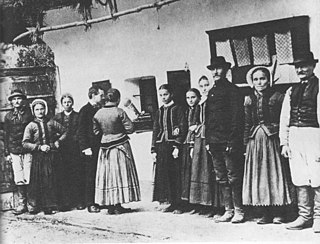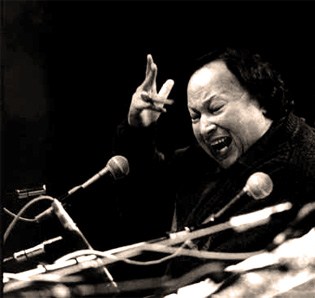Country is a genre of popular music that originated with blues, church music such as Southern gospel and spirituals, old-time, and American folk music forms including Appalachian, Cajun, Creole, and the cowboy Western music styles of New Mexico, Red Dirt, Tejano, and Texas country. Its popularized roots originate in the Southern and Southwestern United States of the early 1920s.

Disco is a genre of dance music and a subculture that emerged in the 1970s from the United States' urban nightlife scene. Its sound is typified by four-on-the-floor beats, syncopated basslines, string sections, horns, electric piano, synthesizers, and electric rhythm guitars.

Folk music is a music genre that includes traditional folk music and the contemporary genre that evolved from the former during the 20th-century folk revival. Some types of folk music may be called world music. Traditional folk music has been defined in several ways: as music transmitted orally, music with unknown composers, music that is played on traditional instruments, music about cultural or national identity, music that changes between generations, music associated with a people's folklore, or music performed by custom over a long period of time. It has been contrasted with commercial and classical styles. The term originated in the 19th century, but folk music extends beyond that.

Music is the art of arranging sounds in time through the elements of melody, harmony, rhythm, and timbre. It is one of the universal cultural aspects of all human societies. General definitions of music include common elements such as pitch, rhythm, dynamics, and the sonic qualities of timbre and texture. Different styles or types of music may emphasize, de-emphasize or omit some of these elements. Music is performed with a vast range of instruments and vocal techniques ranging from singing to rapping; there are solely instrumental pieces, solely vocal pieces and pieces that combine singing and instruments. The word derives from Greek μουσική.
Pop is a genre of popular music that originated in its modern form during the mid-1950s in the United States and the United Kingdom. The terms popular music and pop music are often used interchangeably, although the former describes all music that is popular and includes many disparate styles. During the 1950s and 1960s, pop music encompassed rock and roll and the youth-oriented styles it influenced. Rock and pop music remained roughly synonymous until the late 1960s, after which pop became associated with music that was more commercial, ephemeral, and accessible.

A soundtrack is recorded music accompanying and synchronised to the images of a motion picture, drama, book, television program, radio program, or video game; a commercially released soundtrack album of music as featured in the soundtrack of a film, video, or television presentation; or the physical area of a film that contains the synchronised recorded sound.

Prince Rogers Nelson was an American singer-songwriter, multi-instrumentalist, record producer, and actor. He was known for his flamboyant, androgynous persona and wide vocal range, which included a far-reaching falsetto and high-pitched screams. Prince pioneered the Minneapolis sound, and his music incorporated a wide variety of styles, including funk, R&B, rock, new wave, soul, synth-pop, pop, jazz, and hip hop. He often played most or all instruments on his recordings.
Traditional pop is Western pop music that generally pre-dates the advent of rock and roll in the mid-1950s. The most popular and enduring songs from this era of music are known as pop standards or American standards. The works of these songwriters and composers are usually considered part of the canon known as the "Great American Songbook". More generally, the term "standard" can be applied to any popular song that has become very widely known within mainstream culture.
A music video is a video of variable length, that integrates a music song or music album with imagery that is produced for promotional or musical artistic purposes. Modern music videos are primarily made and used as a music marketing device intended to promote the sale of music recordings. There are also cases where music songs are used in tie-in music marketing campaigns that allow them to become more than just a song. Tie-ins and music merchandising can be used for toys or for food or other products.
A songwriter is a musician who professionally composes musical compositions and writes lyrics for songs. A songwriter can also be called a composer, although the latter term tends to be used mainly for individuals from the classical music genre and film scoring, but is also associated writing and composing the original musical composition or musical bed. A songwriter who mainly writes the lyrics for a song is referred to as a lyricist. The pressure from the music industry to produce popular hits means that song writing is often an activity for which the tasks are distributed between a number of people. For example, a songwriter who excels at writing lyrics might be paired with a songwriter with the task of creating original melodies. Pop songs may be composed by group members from the band or by staff writers – songwriters directly employed by music publishers. Some songwriters serve as their own music publishers, while others have outside publishers.

Nusrat Fateh Ali Khan was a Pakistani vocalist, musician, composer and music director primarily a singer of qawwali, a form of Sufi devotional music. He is considered by some to be the greatest Sufi singer in the Punjabi, Hindi and Urdu language, and one of the greatest qawwali singers in history; he is often referred to as "Shahenshah-e-Qawwali". He was described as the 4th greatest singer of all time by LA Weekly in 2016. He was known for his vocal abilities and could perform at a high level of intensity for several hours. He belonged to the Qawwal Bacchon Gharana extending the 600-year old qawwali tradition of his family, Khan is widely credited with introducing qawwali music to international audiences.
Gospel music is a genre of Christian music. The creation, performance, significance, and even the definition of gospel music varies according to culture and social context. Gospel music is composed and performed for many purposes, including aesthetic pleasure, religious or ceremonial purposes, and as an entertainment product for the marketplace. Gospel music often has dominant vocals with Christian lyrics. Gospel music can be traced to the early 17th century.
The music of Bangladesh spans a wide variety of styles. Bangladesh claims some of the most renowned singers, composers and producers in Asia. Music has served the purpose of documenting the lives of the people and was widely patronized by the rulers. It comprises a long tradition of religious and regular song-writing over a period of almost a millennium.

"Auld Lang Syne" is a popular song, particularly in the English-speaking world. Traditionally, it is sung to bid farewell to the old year at the stroke of midnight on New Year's Eve. By extension, it is also often heard at funerals, graduations, and as a farewell or ending to other occasions; for instance many branches of the Scouting movement use it to close jamborees and other functions.
Dance-pop is a popular music subgenre that originated in the late 1970s to early 1980s. It is generally uptempo music intended for nightclubs with the intention of being danceable but also suitable for contemporary hit radio. Developing from a combination of dance and pop with influences of disco, post-disco and synth-pop, it is generally characterised by strong beats with easy, uncomplicated song structures which are generally more similar to pop music than the more free-form dance genre, with an emphasis on melody as well as catchy tunes. The genre, on the whole, tends to be producer-driven, despite some notable exceptions.

An album is a collection of audio recordings issued as a collection on compact disc (CD), vinyl, audio tape, or another medium such as digital distribution. Albums of recorded sound were developed in the early 20th century as individual 78-rpm records collected in a bound book resembling a photograph album; this format evolved after 1948 into single vinyl long-playing (LP) records played at 33+1⁄3 rpm.

Thomas Hall, known professionally as Tom T. Hall and informally nicknamed "the Storyteller", was an American country music singer-songwriter and short-story author. He wrote 12 No. 1 hit songs, with 26 more that reached the Top 10, including the No. 1 international pop crossover hit "Harper Valley PTA" and "I Love", which reached No. 12 on the Billboard Hot 100. He is included in Rolling Stone's list of 100 Greatest Songwriters.
A soundtrack album is any album that incorporates music directly recorded from the soundtrack of a particular feature film or television show. The first such album to be commercially released was Walt Disney's Snow White and the Seven Dwarfs, the soundtrack to the film of the same name, in 1938. The first soundtrack album of a film's orchestral score was that for Alexander Korda's 1942 film Rudyard Kipling's Jungle Book, composed by Miklós Rózsa.

The Golden Disc Awards is an annual South Korean major music awards ceremony that honors achievements in the local music industry. The awards ceremony was founded with the purpose to promote popular culture creativity, discover new artists, and contribute to the growth of the music industry. The first ceremony was held in 1986 and is recognized as one of the most prestigious music awards in South Korea.
Popular music is music with wide appeal that is typically distributed to large audiences through the music industry. These forms and styles can be enjoyed and performed by people with little or no musical training. It stands in contrast to both art music and traditional or "folk" music. Art music was historically disseminated through the performances of written music, although since the beginning of the recording industry, it is also disseminated through recordings. Traditional music forms such as early blues songs or hymns were passed along orally, or to smaller, local audiences.









